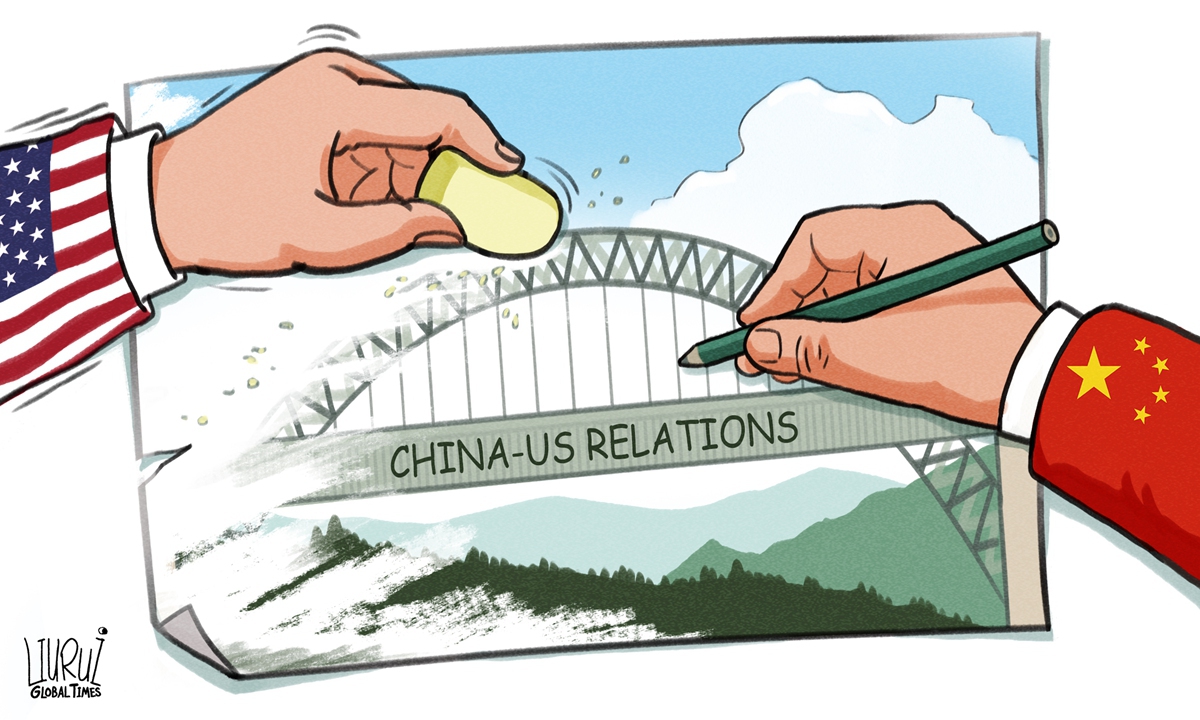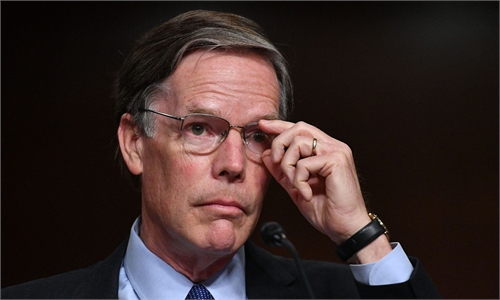With Burns crossing the line, Chinese will not indulge such words and deeds: Global Times editorial

China-US relationship. Illustration: Liu Rui/Global Times
US Ambassador to China Nicholas Burns has not drawn wide attention since taking up his position in China six months ago. But recently, taking advantage of US house speaker Nancy Pelosi's provocative visit to the island of Taiwan, Burns has gained a wave of "negative" traffic.In an interview with CNN on Friday, he slammed China for "overreacting," saying "it was a manufactured crisis by the government in Beijing." He also said the government in Beijing needs to "convince the rest of the world that it will act peacefully in the future."
Many US media outlets deliberately accentuated their tone when covering the interview, with headlines highlighting that the US ambassador to China told China it "must" show that it was not a "destabilizing factor" in the Taiwan Straits, making Burns' statement even harsher and more arrogant and at great odds with his position as a senior diplomat.
Since Pelosi visited the island of Taiwan, the US government has been repeatedly releasing disinformation to the outside world, attempting to pass the buck to China for triggering the cross-Straits tensions. First, it said Pelosi's trip to Taiwan was her "personal decision" and that the US Congress is an "independent branch." It later accused China of escalating the situation and "destroying" the status quo in the Taiwan Straits. Burns said a lot this time, but nothing new. It's still the clichés of Washington's sophistication on Pelosi's provocative visit, and the hegemonic logic of making unfounded countercharges.
China's position and manner on the Taiwan question could not have been clearer. The reasons and consequences of Pelosi's provocative trip to Taiwan are self-evident; the right and wrong are clear at a glance; and the vast majority of people in the international community can see it clearly. The US Congress is a crucial part of the US government stipulated by the US Constitution. Pelosi, as house speaker, represents the US. Pelosi's provocative visit to Taiwan has severely violated the commitment of no official relationship between the US and the Taiwan island, which thereby seriously undermined the status quo in the Taiwan Straits. Washington's provocative practices came first and took place one after another. In any case, it is the US that "must" show China and the rest of the world that it is not a threat to peace and stability across the Taiwan Straits.
Burns, widely regarded as a scholarly diplomat with extensive experience, took up the position at a time when the US ambassador to China had been remaining vacant for a year and five months and China-US relations were at what he called the "lowest moment since 1972." He can be said to be "appointed at a time of crisis." But his overall performance in the past six months, especially this TV interview, showed that he has not embodied any deeper or wiser thinking on China-US relations and great power politics than some other Washington politicians, nor has he played a due role in promoting rational decision-making in Washington on China.
We have to say that this is very disappointing. After more than six months as the US ambassador to China, Burns has made irresponsible remarks about China's internal affairs, far more than his constructive interpretation of China-US relations. He has participated in various US online conferences and arrogantly talked about China-related issues, far more than his active acts to restore China-US relations. He has been busy discussing how to deal with China with the agencies of the US' allied countries stationed in China, far more than having friendly engagements with people from all walks of life in China. Burns' situation shows that Washington has become a big dye vat, and the number of people who can stay untainted coming out of mud has declined. US' rationality toward China is being corroded more and more seriously, and showing toughness toward China has become the least risky and the cheapest option for Burns.
On the same day when Burns was interviewed, former US secretary of state Henry Kissinger had an exclusive interview with CNN. The 99-year-old once again said Pelosi's visit to Taiwan was "unwise," pointing out the tension between China and the US could turn into "the greatest challenge facing humanity" and "the world today would look infinitely worse than it did after World War I." Therefore, he said it is the duty of China and US' foreign policy circles "to discuss issues that can get out of hand." However, the problem is that such strategic rationality and wisdom has not received enough attention from Washington policymakers, and he is facing the embarrassment of no successor in the US. As the US is a country of huge destructive power, its current state is extremely dangerous to the US itself, to China, and even to the whole world.
Against this backdrop, we should adhere to the bottom-line thinking when dealing with China-US relations. We do not know whether Burns and his like have realized that some of their words and deeds have seriously crossed the bottom line. Noninterference in each other's internal affairs is the basic norm in international relations, and ambassadors must abide by this bottom line. In addition to the Taiwan question, Burns has repeatedly criticized China's internal affairs including Xinjiang- and Hong Kong-related affairs. Even a US ambassador to China is so willful, it is conceivable how strong Washington's impulse to interfere in China's internal affairs is. We would like to say to Washington in particular that Chinese people will not indulge your behaviors that have crossed the line, and do not criticize China's "overreaction" again.
There is an opinion that in the current context, Burns has limited room to maneuver and his role is awkward. This is true to a certain extent, but "being limited" does not mean "nothing." In fact, at this important historical juncture, the initiative and special significance of a US ambassador to China should not be underestimated. There are too many people who demolish the bridge in China-US relations and there are too few who help establish it. If even the US ambassador to China joins in dismantling the bridge, then the situation would only get worse. In this regard, we may refer to Chinese Ambassador to the US Qin Gang's definition of his role: "a bridge, a listening post and a helping hand."

